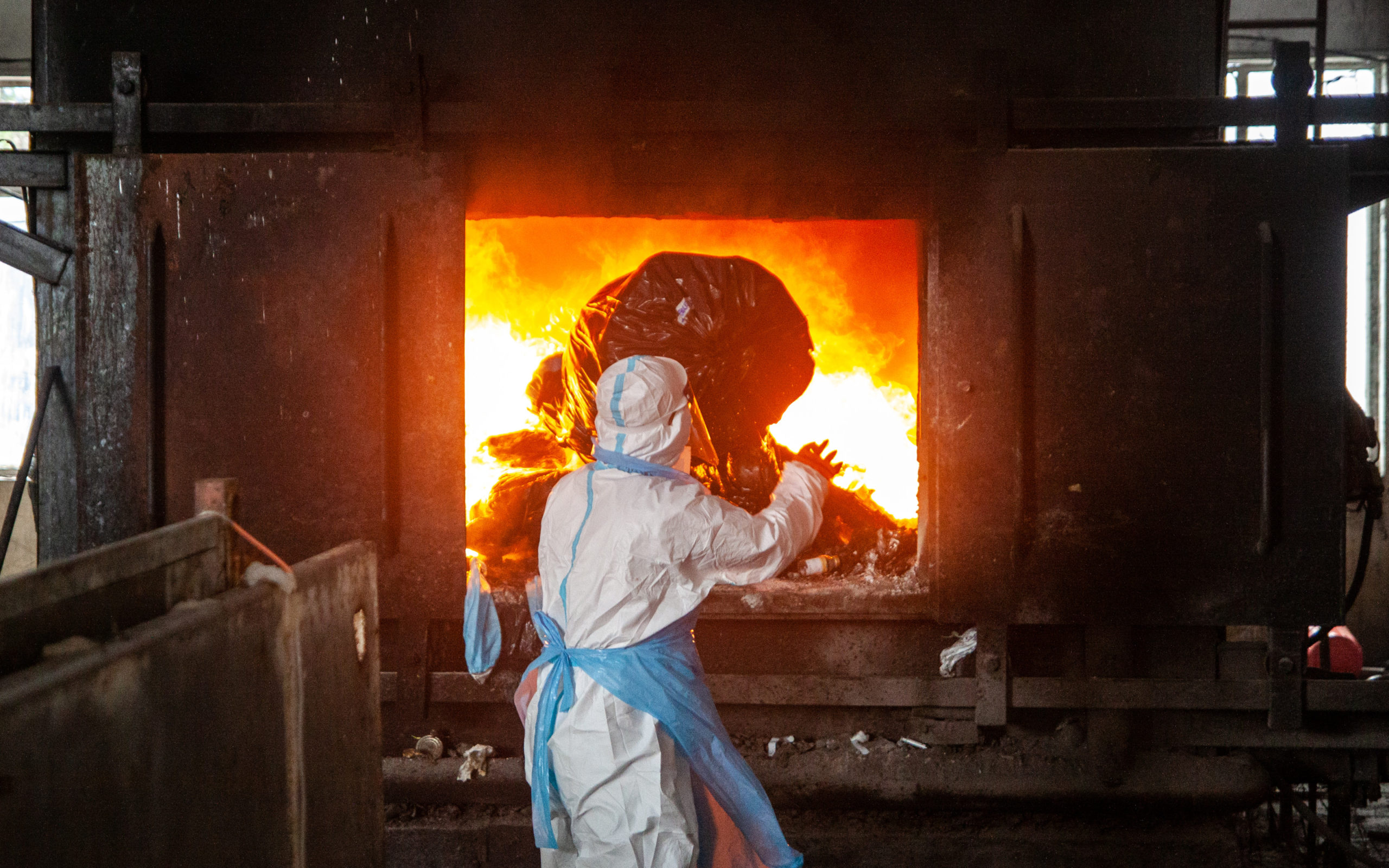As one of the Medical Waste Management Unit’s trucks rumbles through the gates of the landfill site in Phnom Penh’s Dangkor district, Nguon Sokheng and his team begin the arduous process of suiting up to deal with the Covid-19 waste arriving.
The seven-man team are working seven days a week, often for up to 10 hours a day, as the volume of medical waste in Phnom Penh has exploded following the February 20 community outbreak. Having made it through 2020 and up to February 20 with fewer than 600 reported cases, Cambodia’s much-touted pandemic response has been tested and found wanting as the total number of Covid-19 cases recorded stood at 27,638 as of May 27.
“Both incinerators are burning all day every day,” says Sokheng, motioning to the heat rippling out of the glowing mouths of the two iron furnaces. “If we could get one more, it would make things faster and safer for us.”
The unit has, over the course of the pandemic, been able to afford two new trucks — swelling their fleet’s ranks to seven. As one of the older models pulls into the warehouse, Sokheng and two other men don their new personal protective equipment, which consists of a white jumpsuit, a hairnet, rubber gloves, rubber boots and a blue bib. Sokheng wraps masking tape around the sleeves and trouser legs of the jumpsuit to seal himself in.
“All the PPE, it’s all single-use except for the gloves and the boots. We go through about 20 suits each per day — there’s no air in them, it’s so hot working around the furnace in the suit, most people can only take it for 30 minutes at a time,” he says.
“Unless we’re really busy, then we can do it for an hour,” he adds as he walks over to the truck to help unload.
And the unit’s landfill team has been busy, especially compared to April 2020, when the team was stressed out by the 2 tons of medical waste they were receiving daily. By May 2021, they are dealing with 20 tons a day, the vast majority of which is Covid-19 waste.
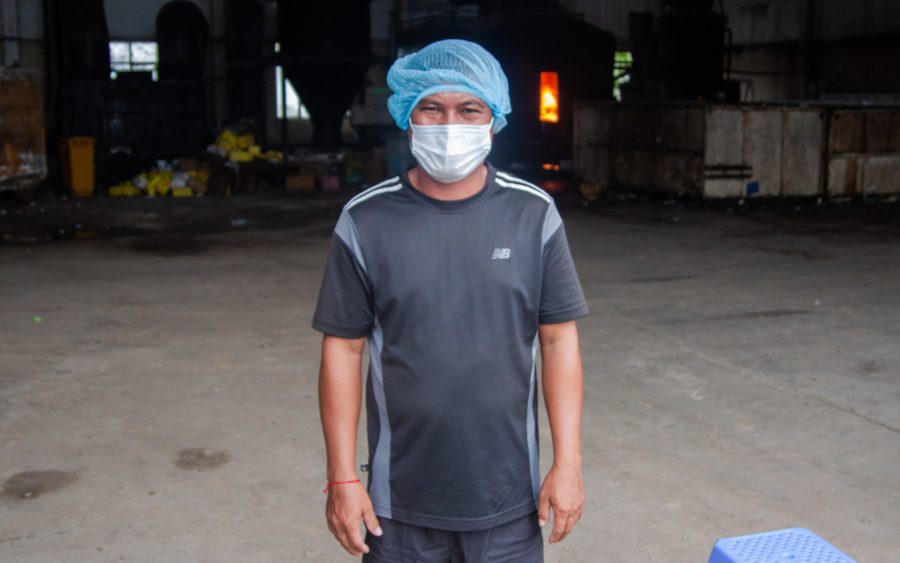
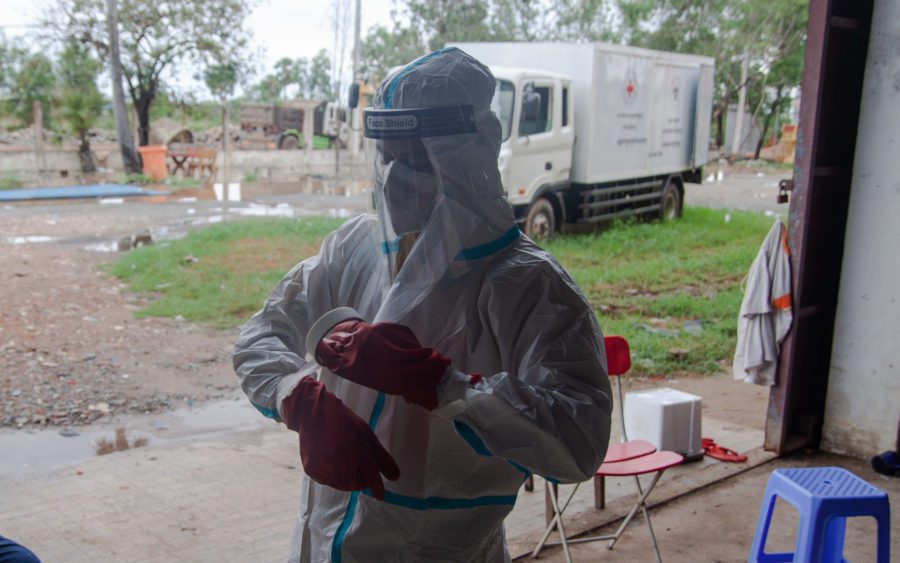
Fear Lingers
Usually the regular medical waste, collected from more than 2,000 hospitals and health centers across the city, arrives in the morning, while the Covid-19 waste is delivered for incineration in the afternoon. But at 11 a.m. on May 24, a truck carrying Covid-19 waste arrives early, and Sokheng’s team frantically begins hurling the thick yellow plastic bags marked “biohazard” into the skips that separate the waste by type.
They work until the truck is emptied, after which its driver promptly takes off again. The unit is now responsible for disposing of the waste generated by nine Covid-19 quarantine centers across Phnom Penh. The 15-strong team of drivers and their seven trucks are spread thin and must make repeat trips to cope with the sheer volume of waste generated by Cambodia’s pandemic response.
“Everything that goes into the quarantine centers has to be considered Covid-19 waste,” explains Ung Sokoun, who works on the unit’s collection team. “So if the patients or doctors eat watermelons, the leftover watermelon skin is Covid-19 waste — it’s not just needles and test swabs.”
Collecting waste from the Great Duke Hotel, Luang Mey Hospital, the National Center for Tuberculosis and Leprosy Control and Chak Angre Health Center, Sokoun’s days are long, and he is worried about how the job might affect his family.
“We’ve all been vaccinated. The whole MWMU and family members they live with all got Sinopharm” early in the year, says Sokoun. The unit has about 50 employees total.
“But we still have to be so careful,” he says while looking over his PPE. “Of course I’m afraid, we all are, but it’s our duty.”
Sokheng is also trying to balance the necessity of his work with the safety of his family, with whom he has now become next-door neighbors.
“We live in the same building, but in two separate rented rooms — one for me, one for my wife and three children — it’s for their safety,” he says. “Even though we’re all vaccinated, we’re always worried.”
After the skips are emptied of Covid-19 waste, Sokheng and his team step away from the sweltering heat of the incinerator but stop short of exiting the warehouse. Along comes another man, sporting just a mask and rubber gloves, carrying a large hand-pump spray bottle containing alcohol.
The three men who moments before had been hurling bags of Covid-19 waste into flames are now standing patiently as the man with the bottle meticulously sprays each of them down from head to toe. Once sufficiently drenched in sanitizer, each man peels away from the group and strolls back toward the incinerators and begins to strip down, cautiously throwing each item of PPE into the waiting flames.
Each then returns to the man with the spray bottle to once again be coated in the cleansing mist of alcohol.
When asked why they spray the suits down before burning them, Sokheng grins. “We have to be careful.”
The whole process of getting the PPE on and off again takes around 15 to 20 minutes each time, but it is a process they cannot afford to skip.
“I always worry we will make a mistake,” says Sokheng as he washes down the boots and gloves. “I’m so tired all the time, ever since February 20. I work all day, go home, sleep, wake up, repeat. I’m exhausted just from the stress.”
Sokheng explains that neither himself nor his team have had much in the way of health check-ups — neither physical nor mental — and is worried how it will impact his body and his mind in the long-term. He has already worked for the Medical Waste Management Unit for 11 years and doesn’t know what other work he would be fit for.
“I know it is important work and that it needs doing, but most people don’t even know we exist, we deal with Covid-19 all day every day and yet people just think of doctors when they think of frontline workers,” he says, smile vanishing. “Nobody asks where the waste goes.”
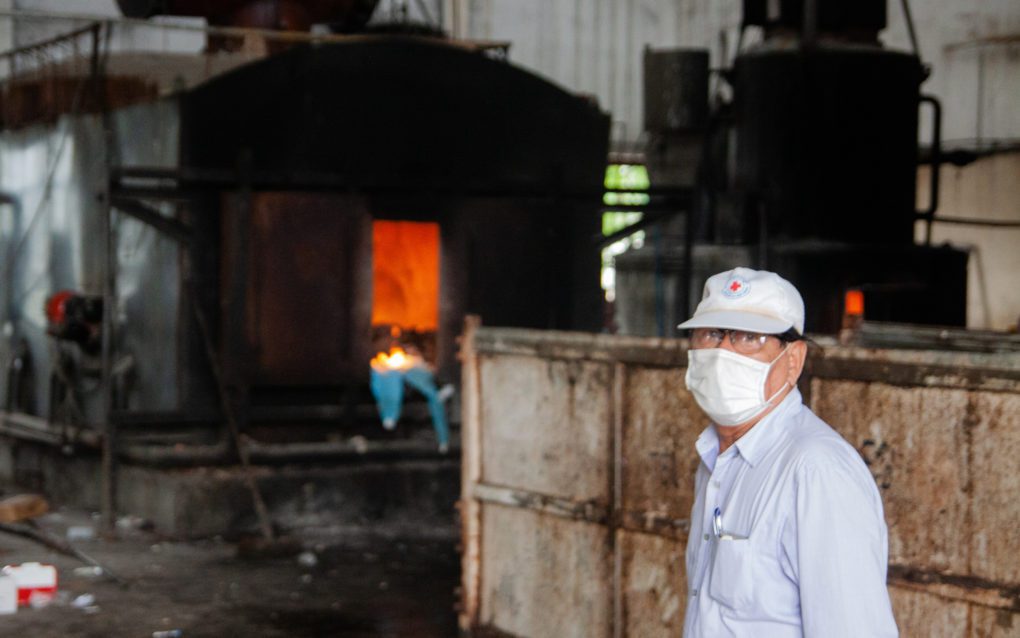
Overworked and Undervalued
But while the team at the landfill site remain uncertain, unappreciated and overworked, the unit’s deputy director So Simarong is proud of his team’s resilience during the worst Covid-19 outbreak Cambodia has seen yet.
“We’ve been so much busier than usual, the volume has shot up,” he says. “The volume of regular medical waste has actually dropped significantly. A lot of smaller clinics we used to collect from have even closed. But the overall volume has grown so much.”
Just 9 tons of each month’s total disposed waste is regular medical waste, Simarong estimates, but the amount of Covid-19 waste varies each month.
Last year Simarong was worried about keeping his staff on the job, but has had to fight to be able to offer them incentives needed to keep the unit at operational capacity.
Essentially, the unit operates as a private waste disposal business: Each hospital or health center is a paying client with fees determined by the number of beds, the nature of the facility and the volume of waste generated. But the Covid-19 quarantine centers operated by the Ministry of Health each have a constantly changing volume of both patients and waste, so Simarong says he just has to estimate the fees to charge them.
‘An Extra $5 Each Day’
Despite this sudden shock to their business model, the unit’s parent organization, the Cambodian Red Cross, still demands the MWMU pays back any profits to its parent organization and expects a minimum of $2,000 each month, Simarong says. As a result, he has had to push to get his staff a $5 per day bonus on top of their monthly salaries, which range from $180 to $250.
The Cambodian Red Cross could not be reached for comment by phone, and has not replied to questions over email.
“At first the staff were afraid. They all wanted to quit because they were worried they’d get sick, so we had meetings to see how to resolve it and that’s how the $5 daily bonus came about,” he says, noting that it wasn’t easy, but adding that the increased volume of waste helped generate more revenue.
“Everything we’ve bought over the last year, we’ve bought ourselves,” he says. When the unit purchased two new trucks, they couldn’t afford to stop using the old ones due to the growing number of Covid-19 cases.
The older trucks, he explains, have a habit of breaking down — often with a full load of Covid-19 waste inside — which means diverting one of the newer trucks to go and transfer the waste, spraying down the inoperable truck with alcohol — the unit uses 30 liters of alcohol spray each week — and then getting it to the garage for repairs.
“With the PPE, yes, we get some from the quarantine centers, but we go through so much that we need to buy more and it all comes out of our pockets. We desperately need a new incinerator, but we can’t afford it,” Simarong says.
“No NGO, no donor, certainly not the government nor the oknhas — nobody has supported us. My team are mostly frontline workers, they deal with Covid-19 every day, but we cannot afford to pay them any better. I wish we could. I know it would make them feel more valued,” he says.
Simarong says that he has been advocating to get them similar benefits to state employees, chiefly better insurance and a state pension, but he concedes it’s unlikely to happen.
“We’re a private company operating through an NGO, but doing the government’s work — so it’s complicated,” Simarong says, adding that the challenges come when someone quits. “Replacing [staff] is very difficult. Nobody wants to do this work.”
Fortunately, Simarong says, nobody on his team has caught Covid-19, which he feels is a reflection of the precautions taken, but it hasn’t quelled the fears many of his staff still harbor.
“Yes, we’re careful, we’ve got our PPE, but the incinerators are unreliable,” says Khem Sam, who works alongside Sokheng at the MWMU warehouse. “When one breaks down, the waste builds up. We need at least one more [incinerator]. It would be better if we had two or three more, to be honest.”
It has taken Sam some time to come around to the idea of dealing with Covid-19 waste — especially on this scale — but he too is torn by self-preservation and the necessity of his work.
“It’s only the MWMU that has the equipment to dispose of this waste, but the $5 bonus isn’t much, honestly. I hope it’s only short-term. I hope Covid-19 ends soon,” he says.
Sokheng chimes in, a grim smile on his face.
“There’s too much waste for us,” he adds. “I hope it improves soon too, because an extra $5 each day isn’t enough to keep risking my life every day.”
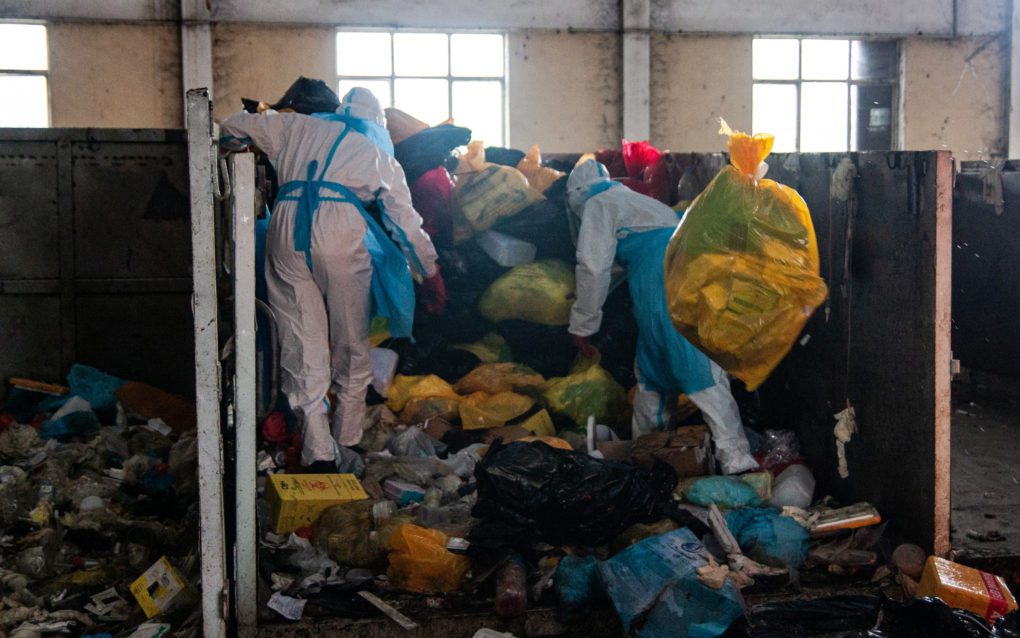
Building Capacity
There is, however, a glimmer of hope on the horizon in the form of a U.N. Development Program project being run together with the Chinese government. From January to December 2021, the UNDP and China will spend $914,750 on a medical waste capacity-building project with Khmer-Soviet Friendship Hospital, Chak Angre Health Center and the National Pediatric Hospital.
“We will provide medical equipment and training to healthcare workers and service providers for the proper treatment of solid waste and wastewater,” explains Nick Beresford, the UNDP’s resident representative.
The project will provide PPE kits for staff, trolleys, reusable containers, medical disposable sterilization test packs, color-coded plastic bags and disposal bins, Beresford says, noting it could also provide on-site incinerators at medical facilities.
What this means for the MWMU remains unclear, but certainly the project — if successful — has the potential to ease the burden currently borne by Simarong’s team.
Simarong says he is unaware of any U.N. project, but welcomes any initiative that reduces the risk to his team.
“I call on any donors who are able to help us, please help us — we need new equipment, more staff and better protection for them,” he says. “This is important work, but we need more support.”
Note: The author has reported this series of articles with a Cambodian journalist who requested their name not be included due to fears of reprisal.


